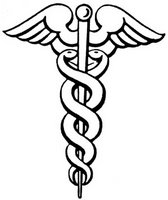Messages in a Bottle: LOST Thoughts #2
This week, several things jumped out at me:
Jack nearly prevents Locke from entering the numbers in time to stop the timer from reaching zero. Unfortunately (or fortunately for the viewers), Locke doesn't make it in time and the counter then begins to flip, displaying a series of red and black figures or glyphs that suggest the following shapes: a man, a boat, a plane, a bird, and finally a squiggle that could symbolize a snake or a rope or a hook. But just before the final figure appears, Locke manages to press the execute button. Hmmm, does this mean that nothing happens when the counter reaches zero? Or that it signals the triggering some sort of program? (A fail-safe?) I kept half-expecting the blast doors (remember those?) to come crashing down around John and have the computer vaporize him or something. But still Locke keeps the incident close to his chest and doesn't mention anything to Jack or Sayid. Locke keep a secret? Nah, he's such a blabbermouth.
The Other. I kept going back and forth about whether or not he was truly an Other or yet another castaway on the island but, like Sayid, I found the story about his wife's death too... convenient and vague. And then the final shot of him crouching in the armory leaves me with no doubt whatsoever: he's one of Them. I love how they have elaborate cover stories that could very well be possible. But a hot-air balloon? Are we in Oz? Which leads me to notice his curious nom-de-guerre: Henry Gale. As in Dorothy Gale's Uncle Henry? And gale as in wind, which carries a hot air balloon aloft? Too coincidental. Which leads me to believe that this Other's cover story is just that: hot air.
One of the U.S. Army officers that escorts Sayid is none other than Kate's dad (not the one she blew up), who asks Sayid if he has a wife or a family. The camera shows us a quick shot of the photograph he's tenderly holding: a picture of a young Kate. Hmmm, two Kate-related intersections in the past two weeks.
(An aside for those of us who watched HBO's dearly departed supernatural Dust Bowl series Carnivale: was anyone else creeped out about Brother Justin (a.k.a. Clancy Brown) playing Joe Inman, the U.S. army interrogator who taught Sayid his, er, skills? I hope this isn't the last we see of him.)
Our castaways seem to be forming two disparate groups that can't seem to co-exist for much longer: a seek and destroy group (Sayid, Locke, Charlie, and Sawyer) that seems to follow Rousseau's way of thinking (kill or be killed) and a sort of live and let life group (Jack, Hurley, Kate) that feels that defense is the way to go and feels a bit squeamish about, you know, torturing and murdering a possible Other. The best use of this division was when Sawyer and Hurley finally found that tree frog that was keeping Sawyer awake. While Hurley wants to take the frog far away where he won't bother anyone, Sawyer knows better and crushes the wee froggie in his hand.
Next episode (whenever that may be): With clinical psychiatrist Libby's help, Claire remembers something about her missing memory--namely the two weeks she was kidnapped--leading her to retrace her steps and uncover another hidden Dharma Initiative station. One that seems to have as its symbol a caduceus*... or is it a Rod of Asclepius**? (See below, from Wikipedia.)
 *Caduceus:
*Caduceus:In the seventh century, the caduceus came to be associated with a precursor of medicine, based on the Hermetic astrological principles of using the planets and stars to heal the sick. The caduceus is used interchangeably with the Rod of Asclepius, especially in the United States. Historically, the two astrological symbols had distinct meanings in alchemical and astrological principles. Occasionally the caduceus may be combined with a DNA double-helix, which the intertwined snakes coincidentally resemble.
**Rod of Asclepius:

The Rod of Asclepius is an ancient Greek symbol associated with astrology and healing the sick with medicine. It consists of a serpent entwined around a staff. Asclepius was the god of healing in ancient Greek mythology. He was instructed in medicine by the centaur Chiron, also connected to the constellation Ophiuchus. In Astrology, some systems include a thirteenth sign of the zodiac, which is the constellation Ophiuchus, and is known as Ophiuchus Serpentarius (the "serpent holder"). This constellation lies between Sagittarius and Libra in the astrological charts. The Rod of Asclepius is frequently confused with the caduceus, which is a symbol of commerce associated with the god Hermes.
